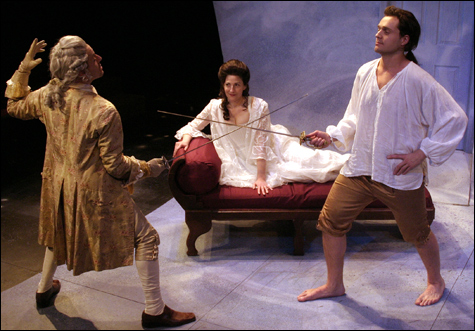
LEGACY OF LIGHT: Karen Zacarias’s play might not be Arcadia, but it’s classy enough to live in Tom Stoppard’s neighborhood. |
Playwright Karen Zacarias would seem to have taken long drafts of Tom Stoppard Elixir. And if the results are not transformative, they are bracing. The Washington-based scribe's new play, Legacy of Light, is a back-and-forth, brain-and-womb hop through the history of women in science. There's the true story of French physicist and mathematician Émilie du Châtelet — a lover and collaborator of Voltaire who died following childbirth in 1749. And there's an invented one centering on a contemporary American astrophysicist who discovers an embryonic planet and doesn't understand why if the Universe can produce a baby she can't. Ingenious, entertaining, and thought-provoking, the play is in the end too contrived to evoke more than also-ran comparison to Arcadia. But even to live in Stoppard's neighborhood is to own valuable dramaturgical real estate. And in its area premiere by Lyric Stage Company of Boston (through March 13), the work, which debuted last year at Arena Stage, shows to advantage.
Janie E. Howland's galaxy-evoking timeshare of a set is occupied in turn by the scientifically and sexually questing Émilie and her bewigged cohort and by science-of-the-spheres-worshipping Isaac Newton Institute fellow Olivia Hastings-Brown, her earnest-schoolteacher husband, and the feisty if financially strapped surrogate they hire to bear their baby. In the 1700s, Enlightenment cougar Émilie goes hot and heavy with poet Jean François de Saint-Lambert, the liaison resulting in pregnancy at 42. Fearing death in childbirth, she rushes to complete her major work, the French translation (with corrections) of Newton's Principia Mathematica. Meanwhile, in the present, Olivia wrestles not only with career obsession and infertility but also with her ambivalence about impending motherhood.
This is heady stuff — even if it's easy to see the playwright's spreadsheet laid out, its parallels underlined and supporting characters carefully double-cast (and even if, in the beginning, the harpsichord-backed 18th-century dialogue is absurdly stilted). Director Lois Roach makes the most of Zacarias's double-pronged drollery, with the historical figures stepping out of their reality, and later their deaths, to converse not only with their modern counterparts but also with us, supplying Wikipedia-esque background and arch commentary. Charles Schoonmaker's costumes are a marvelous mix of period frippery, simple elegance, and Project Runway wanna-be. And the satisfying performances run the gamut from Sarah Newhouse's lusty, steely Émilie to Susanne Nitter's piercingly sincere Olivia, with Diego Arciniegas an amusingly sometimes-less-than-Enlightened Voltaire. But it's hard to go deep when you're busy on the surface connecting the dots.
Fewer frequent-flyer miles stack up in Masha Obolensky's journey into 1920s tabloid history and the fierce mind of playwright Sophie Treadwell, Not Enough Air (presented by Nora Theatre Company at Central Square Theater through March 14). If sharper in its conception than in its development, the play, in Melia Bensussen's feverish East Coast premiere, is made compelling by its co-opting of some of the devices — including noise and repetition — employed by Treadwell in the then-groundbreaking Machinal, a 1928 Expressionist exploration of dehumanization inspired by the 1927 trial of Queens housewife Ruth Snyder and her lover for the murder of her husband (a crime that also inspired James M. Cain's Double Indemnity).